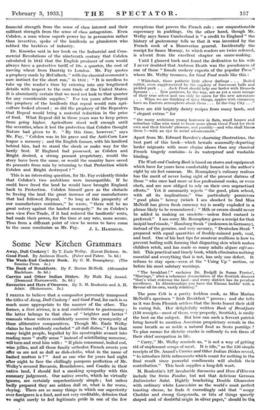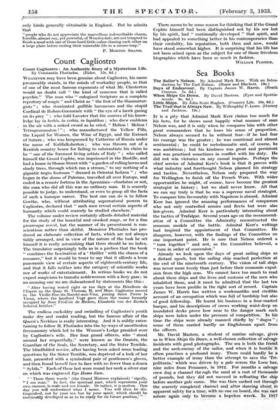Some New Kitchen Grammars
Soncino Press. Os.)
Savouries and Hors d'Oeuvres. By X. M. Boulestin and A. H. Adair. (Heinemann. 2s.) I PREFER to believe that a compositor perversely transposed the titles of Away, Dull Cookery ! and Good Food, for each is so much more appropriate to the manner of the other. The former, a livre sirieux, is a real contribution to gastronomy ; the latter belongs to that class of " brighter and better " manuals whose writers confidently assume the synonymity of these alliterative comparatives. Though Mr. Earle Welby claims he has ruthlessly excluded " all dull dishes," I fear that many bright people, beguiled by his apostrophic avaunt into reading mere " stuffy sense " instead of scintillating nonsense, will turn and rend him with : " If plain consomme, boiled cod, wine jellies, and all those fussily orthodox French sweets you offer us are not as dull as dish-cloths, what in the name of hashed mutton is ? " And as one who for years had night after night to face the chillingly pompous perfection of Mr. Welby's revered Bavarois, Bourdaloues, and Condos in their native land, I should feel a sneaking sympathy with this summary judgement. Our native sweets, which he virtually ignores, are certainly unpretentiously simple ; but unless badly prepared they are seldom dull or, what is far worse, cloying. There are so many things in which our superiority over foreigners is a fond, and not very creditable, delusion that we ought surely to feel legitimate pride in one of the feii
exceptions that proves the French rule : our unquestionable supremacy in puddings. On the other hand, though Mr. Welby says Sauce Cumberland is " a credit to England " the history of gastronomy tells us that it was invented by the French cook of a Hanoverian general. Incidentally the receipt for Sauce Mornay, to which readers are twice referred, is absent from the excellent chapter on sauce-making.
Until I glanced back and found the dedication to his wife I never doubted that Ambrose Heath was the pseudonym of one of those " female cookery experts of the popular Press" whom Mr. Welby trounces, for Good Food reads like this : " Whitebait, those pathetic little silver darlings . . . Boiled rabbit, even supplemented by the cajolery of forcemeat balls and pickled pork . . . Jack Frost should help our larder with Brussels Sprouts . . . New potatoes, by the way, are as yet a mere mirage of their true selves and can only he eaten for the new adventure . . When we are thinking of spicy things, apples with cinnamon have an Eastern atmosphere about them . In the Gay City . .
There are 450 brightly dainty recipes from many lands, and " elegant extras " for
" the many ambitious young hostesses in fiats, small houses and suburban villas who want to know more about Good Food for their own and their friends' pleasure, and possibly—and who shall blame them I—with an eye to social advancement."
Apart from Mr. Edward Bawden's charming illustrations, the best part of this book—which bewails seasonally-departing larder migrants with more elegiac alases than any classical French tragedy contains—is its waterproof and washable binding.
The Week-end Cookery Book is based on stores and equipment which have for years been comfortably housed in the author's eight by six feet caravan. Mr. Boumpbrey's culinary realism has the merit of never losing sight of the present distress of those " who once had more or less professional cooks, or even chefs, and are now obliged to rely on their own unpractised efforts." Yet it summarily rejects " the good, plain school, with all its implications." One particularly pernicious " good plain " heresy (which I am shocked to find Miss McNeill has given fresh currency to) is neatly exploded in a phrase likely to be remembered : " Milk or cream should never be added in making an omelette—unless fried custard is preferred." I am sorry Mr. Boumphrey gave a receipt for that insipid beef rissole, " Hamburg Steak " (unknown in Germany), instead of the genuine, and very savoury, " Deutsches Steak ! prepared with equal quantities of freshly-minced pork, veal, and beef. One of his best tips for amateur scullions is how to prevent boiling milk forming that disgusting skin which makes children retch, and has made so many adults abjure cafe-au- lait. This practical and timely book, which eliminates nothing essential and everything that is not, has only one defect. It refuses to stay open—even at the " Using Up " section, or before his most salutary warnings.
" The breakfast ! " exclaims Dr. Redgill in Susan Ferrier', "Marriage," after a vehement denunciation of the Scottish dinners "that's what redeems the land—and every district has its peculiar excellence. In Aberdeenshire you have the Finnan haddo with a flavour all its own, vastly relishing."
The pure Celt is a pretty feckless cook, as Miss Marian McNeill's specimen " Irish Breakfast " proves ; and she tells us it was from Flemish settlers that the Scots learnt their skill in curing fish. Her delightfully written Book of Breakfasts (150 receipts—most of them, very properly, Scottish), is easily the best on the subject. But how can such a fervent patriot bring herself to mention American proprietary cereals in the same breath as so noble a natural food as Scots porridge ? To plan menus for dietetic cranks is callously to rob them of their chief occupation in life.
" Curry," Mr. Welby reminds us, " is not a way of getting rid of unpleasant scraps of meat. It is idle," as the 150 simple receipts of Dr. Anand's Curries and Other Indian Dishes reveal, " to introduce little refinements which count for nothing in the final result since powerful condiments will abolish their contribution." This book supplies a long-felt want.
M. Boulestin's 127 invaluable Savouries and Hors d'CEurres include the Swiss Fondue, but not that delicious German Balienischer Salat. Rightly bracketing Double Gloucester with ordinary white Lancashire as the world's most perfect toasting cheese, he finds it exceedingly odd that " soapy Cheddar and strong Gorgonzola, or bits of things queerly shaped and of doubtful origin in silver paper," should be Hut
only kinds generally obtainable in England. But he admits that
"people who do not appreciate the marvellous indescribable charm, humble, almost coy, yet powerful, of Wensleydale, are'not tempted to finish a meal with one of those hard little cubes chasing each other on a large plate before ending their miserable life in a mouse-trap."
P. MORTON SHAND.





































 Previous page
Previous page